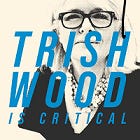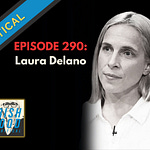Hello friends! This is Julie Ponesse, filling in for Trish while she enjoys some well-deserved rejuvenation. It’s a gloomy, thick-aired morning here, the weather mirroring the surreality of our world.
Still reeling from all the COVID nonsense, Gaza, the Ukraine, and a series of bills that micro-erode our freedom, we now need to make sense of the frenetic death spiral of American politics. And we aren’t supposed to talk, or even think, about any of it.
From my own little corner of the world, I see people radically self-muzzling, assuming the fetal position at the mere thought of speaking into the public space.
A friend experienced this at a recent social gathering when she started to tell a story that happened to involve the word “Palestinian.” (I say “happened” because the story didn’t depend on the character’s ethnicity.) But the moment the word came out, she faced the typical hush cues — glances and sighs that commanded “Don’t go there,” “You can’t say that” — as if the word, itself, would shatter the peace. It made me wonder, how solid could the peace have been if it could be destroyed with one word? And would we actually be better to embrace a little social vibration?
These days, it feels like I’m always on the verge of a social free fall, most conversations reminding me of that leap-of-faith scene in “The Last Crusade” where Indiana Jones has to take a step into the emptiness before the next stone appears.
This week, I had the privilege of interviewing Queen’s law professor Bruce Pardy. One thing I deeply appreciate about Bruce is his willingness to dig into tough topics. Nothing is ‘off-limits’ (as far as I know) and he is quite willing to wade into murky waters and swim around a bit. At one point, we disagreed about the limits of free speech but emerged, I think, unscathed.
Our conversation meanders through topics within the scope of Bruce’s expertise — the Rule of Law, progressivism in Canadian law, and free speech — but the thread that weaves it all together is silence: how silence came to be a virtue, what it is costing us, and how we can change our course.
At the beginning of the podcast, I praised Trish for her approach to conversation, referencing Marc Antony’s “friends, Romans, countrymen, lend me your ear” line that begins one of the most famous speeches in Shakespeare. I have been thinking a lot about the timeliness and timelessness of that line, and the political parallels between our current situation and his.
Like us, Antony is in a precarious position. His friend, Julius Caesar, has just been murdered by the elites of Rome. He wants vengeance, a fact revealed by his hostile sarcasm: “For Brutus is an honourable man; So are they all, all honourable men—.” The stakes are high. If he succeeds, the crowd will avenge Caesar’s murder and Antony will take control of Rome; if he fails, “he will be lynched by an angry mob.”
So, too, will we. If we say the wrong thing, pause too long before saying the right thing, or play it too ‘fast and loose’ with our questioning, we risk a social lynching. Most of us manage the risk by becoming agoraphobics, too afraid to step into the public square for fear of perishing there.
I’m not saying we should speak just for the sake of doing so. Silence can be good. It allows for solace, for gathering our thoughts and figuring out who we are apart from others. And, as Louis Armstrong said, the most important notes are the ones he didn’t play.
But, silence is not always golden. It can be a sign of oppression, a symptom of forces that exclude and destroy people and ideas. And when we are silenced long enough, eventually we lose the ability to notice the things we might speak about.
I have been thinking a lot about how wokeism (leftist political ideology), the Trojan horse that ushered in muteness in the guise of tolerance and empathy, has made us all so terrified to speak.
One thing that surely made us vulnerable to it is our desire for consistency; we want our own internal mapping and our relationships with others to make sense. We want congruence, not conflict. Just like the body seeks homeostasis (from the Greek for “same” and “steady”), we go to great lengths — mostly subconsciously — to maintain social homeostasis through a variety of negative feedback loops. If one of us speaks out and creates too much discord, we bring the tension back into some tolerable range. Democracy, like a stringed instrument, can only handle so much tension.
Unfortunately, we have become so self-indulgent in our desire to avoid confrontation that we are risking losing things that are far more important: the ability to reason, to think, and to explore our humanity together.
Honest, brave conversation actually requires tension; it requires you to hold the plausibility of opposed viewpoints at the same time so you can consider them in relation to each other. If you are going to have a discussion about gender identity, for example, you need to at least consider the possibility that there are (or are not) two genders. Even if only minimally, you have to ‘buy into’ your opponent’s point of view, and that requires a temporary suspension of your own insecurities and ego.
Historically, cultures of silence are created not by tensions between equals but by unequal social relations and by the worry that the utopia some crave will be destroyed if the rest of us become too human. There is nothing new in this. It reminds me of the lecture hall speech by Jake Gyllenhaal’s character in the movie “Enemy”:
“Control, it’s all about control…Lower education, limit culture, censor by any means possible….”
This is where we are. Our culture of silence was created, and is maintained, in order to control us, to keep us oppressed. Speaking out is prohibited because it is the exercise of individuality, and individuality is a form of dissent.
So what do we do?
As the oppressed, we need to realize that we are the ones who need to remake our image. The Brazilian philosopher Paolo Freire wrote that we must first develop a “critical consciousness” in order to recognize our oppression. And then, unavoidably, we need to speak. As Bruce says at the end of our conversation, the most important thing is to “find the courage to say what you think.”
What we need now is more people who are willing to shatter the peace, to complicate conversations, and to ask unanswerable questions.
If you are reading this, if something brought you into Trish’s space, then you likely have this potential. And we need you to stop whatever you’re doing now and take seriously the following question:
Will you live your life as a player in someone else’s game, or will you be a “non-playable character,” controlled by no one?
For what it’s worth, I would rather go down in a fiery inferno by my own hand than live successfully, pleasantly by someone else’s.
What about you?
Thanks for listening and for reading.
—Julie













Share this post